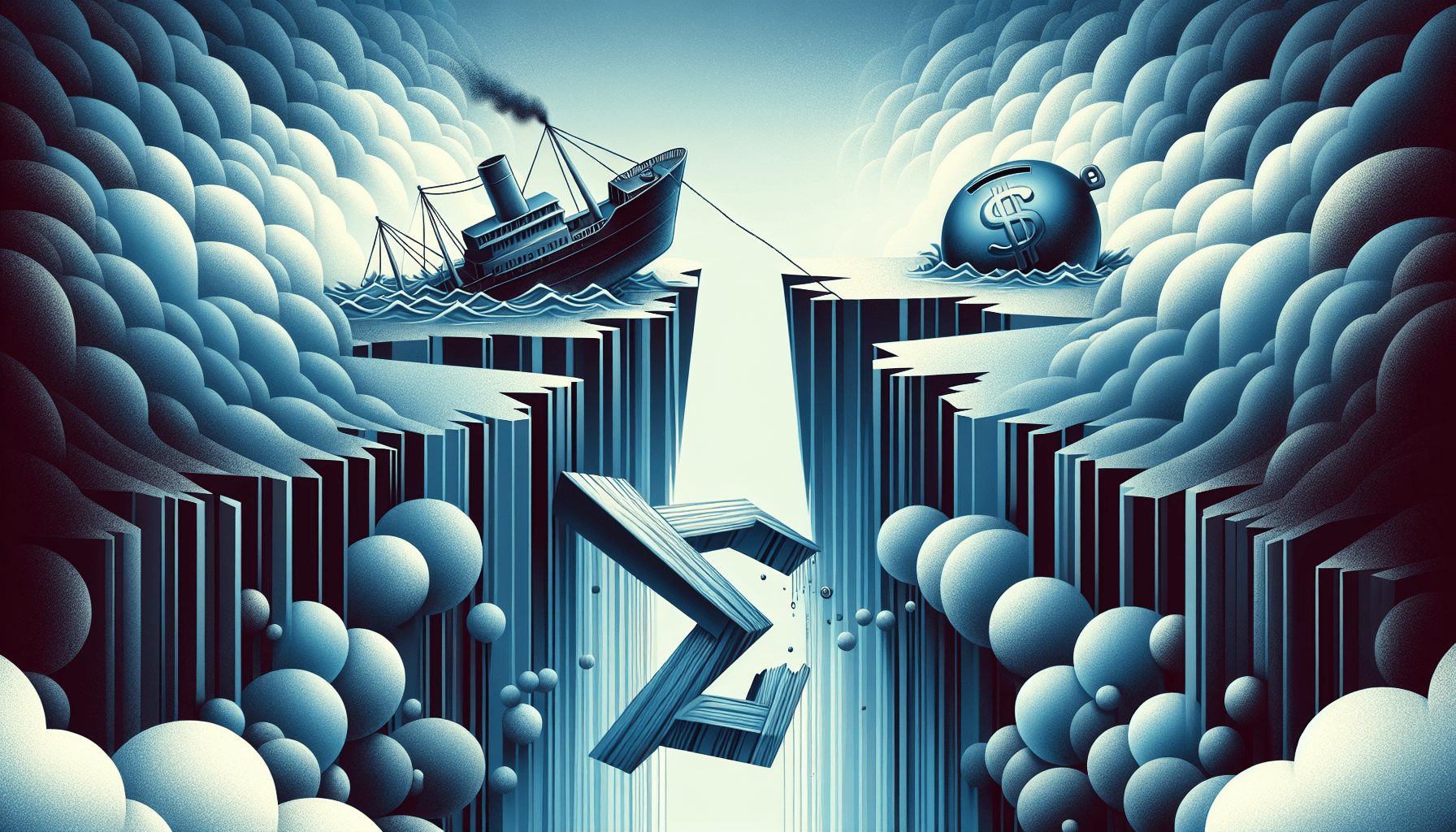Imagine a scenario where the United States falls into a recession. It’s a daunting thought, but it begs the question: what would happen to the US national debt in such a situation? It’s a subject that garners much curiosity and concern, and rightfully so. In this article, we will explore the potential implications of a recession on the US national debt, shedding light on the important economic factors and shedding any unnecessary worries along the way. Get ready to dive into the world of finance and discover what awaits the US national debt in the event of a recession.
Understanding Recession
Definition and causes of a recession
A recession refers to a significant decline in economic activity over a sustained period. It is typically characterized by a decrease in Gross Domestic Product (GDP), an increase in unemployment rates, and a slowdown in various economic indicators. Recessions are caused by a combination of factors, including but not limited to, a decline in consumer spending, reduced business investment, tightening credit conditions, and decreased exports. These factors often create a negative feedback loop, further exacerbating the economic downturn.
Historical examples of recessions in the U.S.
The United States has experienced several recessions throughout its history. Notable examples include the Great Depression of the 1930s, the recession of the early 1980s, and the global financial crisis in 2008. The Great Depression was the most severe economic downturn in U.S. history, characterized by a massive decline in production, widespread unemployment, and deflation. The recession of the early 1980s stemmed from a combination of factors such as high inflation, tight monetary policy, and an oil price shock. The global financial crisis of 2008 was triggered by the collapse of the housing market and the subsequent banking and credit crisis.
The impact of recessions on the overall economy
Recessions have far-reaching effects on the overall economy. They lead to reduced consumer spending, lower business profits, and increased unemployment rates. Additionally, recessions often result in decreased investment and innovation, as businesses become more cautious. The housing market tends to suffer, with declining home prices and increased foreclosures. The impact of a recession can also be prolonged, as it may take time for the economy to recover and regain pre-recession levels of growth and stability.
Understanding National Debt
Explanation of the national debt
The national debt refers to the total amount of money that a country’s government owes to its creditors, both domestic and foreign. It is the accumulation of the government’s budget deficits over time. When a government spends more money than it collects in revenues, it borrows the difference by issuing bonds and other forms of debt. The national debt represents the outstanding balance of these borrowings.
Current status of U.S. national debt
As of [current date], the national debt of the United States stands at [current national debt figure]. It has been steadily increasing over the years, driven by both deficit spending and the accumulation of interest on the existing debt. The current national debt level is [comparison to previous years], reflecting the challenges and economic conditions faced by the nation.
Factors contributing to the increase or decrease of national debt
Several factors contribute to the increase or decrease of the national debt. Government spending plays a significant role, particularly when it exceeds revenues collected through taxes and other sources. Additionally, fiscal policies, such as tax cuts or increases, impact the level of debt. Economic factors like recessions can also influence the national debt as they affect government revenues and expenditures.

Direct Impact of a Recession on National Debt
Decrease in government revenue
During a recession, government revenue often declines as the economy contracts and individuals and businesses face financial challenges. This decrease in revenue is primarily due to reduced incomes, lower corporate profits, and decreased spending. As a result, the government collects fewer taxes, including income taxes, payroll taxes, and corporate taxes. This decline in government revenue contributes to the increase in the national debt.
Increase in government spending
To combat the negative effects of a recession, the government often implements expansionary fiscal policies, including increased government spending. During a recession, there may be a need for additional funding for essential services, such as unemployment benefits, healthcare, and social safety net programs. The increase in government spending further adds to the national debt.
Impact on budget deficit and national debt
The combination of decreased government revenue and increased government spending during a recession exacerbates the budget deficit, which is the difference between government spending and revenue in a given year. The budget deficit is financed by borrowing, resulting in an increase in the national debt. The larger the budget deficit during a recession, the greater the impact on the national debt.
Increase in Government Spending During a Recession
Need for stimulus packages and bailouts
During a recession, the government often implements stimulus packages and provides bailouts to help stimulate economic activity and aid struggling industries. Stimulus packages typically involve increased government spending on infrastructure projects, tax cuts, and various incentives to encourage consumer spending and business investment. Bailouts, on the other hand, involve financial assistance to specific industries or companies facing significant challenges. These measures increase government spending during a recession but can have a positive impact on economic recovery.
Increase in social safety net expenditures
Recessions lead to higher unemployment rates and increased hardship for individuals and families. Consequently, the government’s expenditure on social safety net programs, such as unemployment benefits, welfare, and healthcare, tend to increase during these times. These programs provide essential support to those affected by the recession but contribute to the overall increase in government spending and consequently, the national debt.
Potential implementation of infrastructure projects
To stimulate economic growth and create jobs, governments may undertake infrastructure projects during a recession. These projects, such as building or repairing roads, bridges, and schools, can have a positive impact on the overall economy. However, they also require significant government spending, which adds to the national debt. The long-term benefits of these investments must be carefully weighed against the short-term increase in debt.

Decrease in Government Revenues During a Recession
Falling tax revenues due to decrease in incomes and corporate profits
During a recession, individuals’ incomes often decline due to unemployment or reduced work hours. This decrease in income leads to a corresponding decline in tax revenues, particularly from income taxes. Corporate profits also tend to shrink during economic downturns, resulting in lower corporate tax revenues. The decrease in tax revenues further contributes to the national debt.
Decrease in revenues from other sources
In addition to tax revenues, the government collects revenue from other sources such as tariffs, fees, and fines. However, a recession can lead to decreased economic activity and reduced consumption, resulting in lower revenues from these sources. For example, decreased international trade during a recession impacts tariff revenues. The decline in non-tax revenue adds to the strain on government finances and the national debt.
Indirect Impacts of a Recession on National Debt
Potential inflation or deflation
During a recession, there is a risk of either inflation or deflation, depending on the circumstances. If the government employs expansionary monetary policies, such as increasing the money supply, to stimulate the economy, there may be an increased risk of inflation. On the other hand, if the economy experiences a prolonged period of decreased demand and substantial price declines, deflation may occur. Both inflation and deflation can impact the national debt by affecting interest rates, bond yields, and the cost of servicing the debt.
Effect on investment in government bonds
During a recession, investors often seek safe haven investments. Government bonds are generally considered low-risk investments, especially if issued by a stable government. This increased demand for government bonds may lead to higher prices and lower yields. While this may lower borrowing costs for the government, it can also impact the returns on existing government bonds, potentially affecting the overall national debt.
Impact on interest on existing national debt
As the economy experiences recessionary pressures, central banks typically respond by implementing monetary policies aimed at reducing interest rates. Lower interest rates can reduce the cost of servicing the existing national debt. However, prolonged low-interest rate environments can have long-term consequences, potentially impacting government borrowing costs once the economy recovers. The impact on interest rates and the cost of servicing the national debt depend on various factors, including the severity and duration of the recession.

Comparison with Previous Recessions
Impacts of 2008 financial crisis on national debt
The 2008 financial crisis, triggered by the collapse of the housing market and widespread banking failures, had a significant impact on the national debt. To prevent the collapse of the financial system and stimulate economic recovery, the government implemented various measures, including sizable bailouts of financial institutions and the implementation of stimulus packages. These actions resulted in a significant increase in government spending and contributed to the growth of the national debt.
Impacts of dotcom bubble burst in early 2000s on national debt
The burst of the dotcom bubble in the early 2000s led to a recession in the U.S. economy. While the impact on the national debt was not as pronounced as during the 2008 financial crisis, there were still effects on government revenues and increased spending. The decline in corporate profits resulted in reduced tax revenues, particularly from corporate income taxes. Additionally, the government implemented monetary and fiscal policies aimed at stimulating the economy, contributing to an increase in government spending and the national debt.
Impacts of COVID-19 pandemic on national debt
The COVID-19 pandemic has had a profound impact on the global economy, including the United States. Strict lockdowns and social distancing measures led to a sharp decline in economic activity, causing a recession. To address the economic fallout, the government implemented massive stimulus packages, providing financial support to businesses, individuals, and healthcare systems. These measures significantly increased government spending and further contributed to the national debt.
Future Implications of Increased Debt
Impact on government’s ability to finance future expenditures
An increased national debt poses challenges for a government’s ability to finance future expenditures. As the debt grows, a larger portion of government revenue is allocated towards interest payments on the debt, leaving less available for other critical expenses such as infrastructure investments, education, and healthcare. High levels of debt can limit the government’s flexibility and its ability to respond effectively to future economic downturns or other unforeseen events.
Effect on international lender confidence
A surge in national debt can erode international lender confidence in a country’s financial stability. Lenders may become cautious about extending credit or demand higher interest rates to compensate for perceived risks. The loss of confidence can have serious consequences, including increased borrowing costs, difficulties in raising funds, and potential downgrades in the country’s credit rating. These factors further compound the challenges faced by a nation dealing with a recession and increased national debt.
Potential economic consequences for future generations
The implications of increased national debt extend beyond the current generation. Excessive indebtedness can have long-term economic consequences, impacting future generations’ ability to prosper and thrive. Higher debt levels may necessitate austerity measures, such as reduced government spending or increased taxes, that can hinder economic growth and limit opportunities for prosperity. It is crucial for policymakers to consider the long-term implications of increased debt and strive for sustainable fiscal policies to ensure a strong economic future for generations to come.

Potential Strategies to Manage Increased Debt
Managing budget deficits
One approach to managing increased national debt is focusing on reducing budget deficits. Governments can implement fiscal measures aimed at increasing revenues, such as revising tax policies and closing loopholes, and reducing unnecessary expenditures. Additionally, better oversight and monitoring of government spending can help identify areas where efficiencies can be achieved and reduce wasteful expenditures. Striving for balanced budgets in non-recessionary periods can provide a buffer to absorb the impact of future economic downturns on the national debt.
Revitalizing the economy to increase government revenues
A strong and vibrant economy generates higher government revenues, reducing the need for deficit spending. Governments can focus on implementing pro-growth policies, fostering innovation, and supporting industries that have the potential for high job creation and economic expansion. Encouraging entrepreneurship, investing in education and skills training, and promoting a favorable business climate can all contribute to increased government revenues and a healthier fiscal position.
Renegotiation or restructuring of debt
In situations where the national debt becomes unmanageable, governments may explore options for renegotiating or restructuring debt. This can involve negotiating lower interest rates, extending repayment terms, or even partial forgiveness of debts. While these measures can provide temporary relief, it is essential to consider their long-term consequences and potential impact on future borrowing costs and international reputation.
Concluding Thoughts
Understanding the potential impact of a recession on the national debt is critical for policymakers, economists, and citizens alike. Recessionary periods often necessitate increased government spending and reduced revenues, which can contribute to the growth of the national debt. Managing the national debt becomes even more crucial during and after a recession, as it affects the government’s ability to finance crucial expenditures and impacts future generations’ economic prospects.
It is essential to emphasize the importance of prudent fiscal policies and responsible economic management to mitigate the long-term consequences of increased debt. Pre and post-recession planning, including measures to promote economic growth, reduce budget deficits, and manage the impact of a recession on government finances, are paramount. By understanding the relationship between recessions and national debt, stakeholders can work together to build a robust and sustainable economic future for all.

